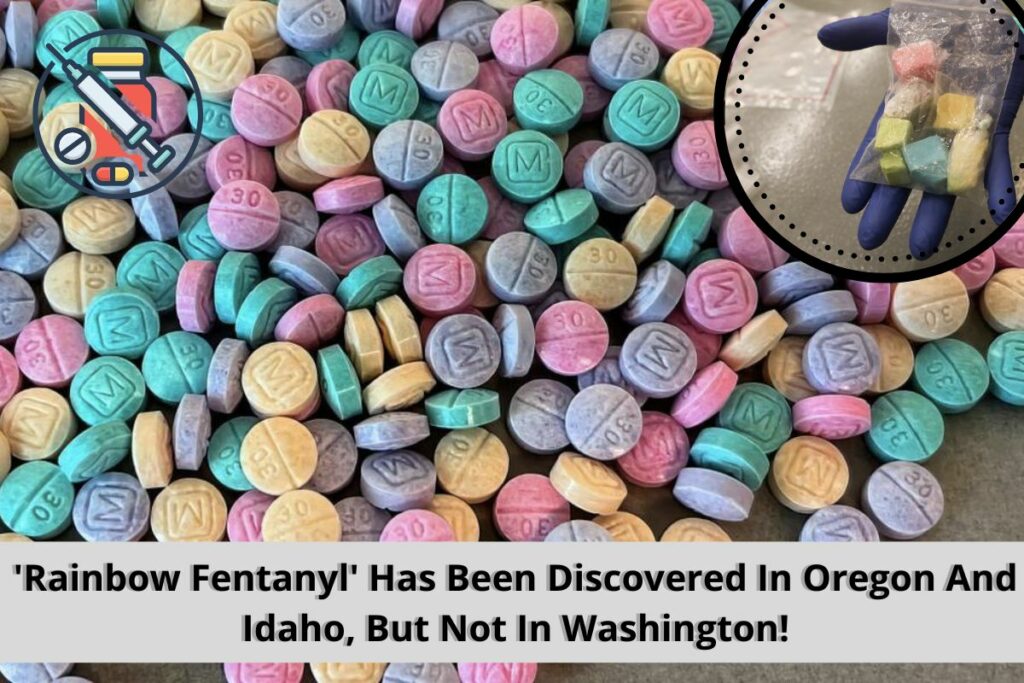Although “rainbow fentanyl” has been identified in other parts of the United States and the Pacific Northwest, police have not yet discovered the narcotic in Washington.
The bright pills will eventually arrive here, if they haven’t already, according to Jake Galvan, acting special agent in charge of the Seattle branch of the U.S. Drug Enforcement Administration. He noted that they have already been found in 18 states, including Oregon, Alaska, and Idaho.
According to Galvan, the fentanyl arrives in a variety of colors and shapes that resemble street chalk, including pills, powders, chunks, and blocks. Authorities think the brightly colored substance, which is just as dangerous as the fentanyl seen here in blue pills, is meant to appeal to teenagers.
According to Galvan, the Sinaloa and Jalisco New Generation cartels are responsible for the colorful fentanyl. As fentanyl is 50% more addictive than heroin and 100 times more addictive than morphine, he continued, many substances are laced with it to increase the addictive component.
In an effort to “sell” narcotics to various demographics, Galvan claimed that drug cartels made a premeditated decision to introduce the colored drugs, knowing that the pills will raise demand. He claimed that they were only interested in making money. Bottom line: They don’t give a damn about who they hurt or murdered.
Synthetic opioid overdose deaths in Washington increased by a factor of two from 2019 to 2020. 337 deaths involving synthetic opioids were documented in 2019, 672 in 2020, and 1,214 in 2021, according to state health officials.
According to Caleb Banta-Green, an epidemiologist and professor at the University of Washington School of Medicine, the stigma and misperceptions surrounding substance use disorders have contributed to the opioid crisis, which has led to an increase in deadly overdoses nationally. According to him, societal and economic forces have also had a significant impact.
According to him, people first take drugs as an escape because they lack the tools to deal with pain or stress in a healthy way and because society has normalized drinking alcohol and smoking as coping mechanisms for people. Banta-Green stated, “Imagine if the thing you find to make you feel wonderful happens to be addicted. Exercise, mindfulness, and yoga are all great but not nearly as strong as methamphetamine or fentanyl, which is not what you found.
Banta-Green claimed that withdrawals cause psychological changes like cravings and that compulsive drug usage is caused by altered brain chemistry in people with substance use disorders. He claimed that when drugs or alcohol take precedence over everything else in your life, social problems result. We have a fallacy that says most people overcome addiction with just their willpower, but it is just untrue.
Because of such a viewpoint, some people lack empathy for drug users and wonder, “Why would I care about them when they don’t care about themselves?” Managing director of stopoverdose.org, Banta-Green explained how to identify, stop, and deal with overdoses. The website also offers resources for the family and friends of those who are battling substance use problems, and it has a tool for locating Washington pharmacies that carry Naloxone, a drug that has been approved by the FDA and works quickly to reverse opioid overdoses.
He claimed that because fentanyl is so inexpensive and short-acting, users quickly build a tolerance to it and increase their intake, increasing their risk of addiction and overdosage.
According to the DEA, there’s currently an influx of rainbow colored fentanyl pills across the United States.
It’s apparently a method being used by drug dealers to sell the deadly fentanyl by making it look like candy to children and young people. pic.twitter.com/8GBMZkSmCa
— BlackySpeakz (@BlackySpeakz) September 1, 2022
Although rainbow fentanyl has not yet been found in Washington, Banta-Green argued that communities should insist that their leaders provide life-saving resources and treat those who are suffering from substance use problems with compassion.
We won’t advance, he continued, “unless we have that political will and popular desire.”
Dear readers, if you have any queries or suggestions, you can put them in our comment section by leaving a comment. Stay tuned with us for the latest updates.

